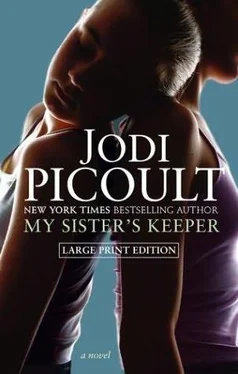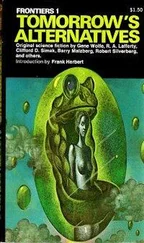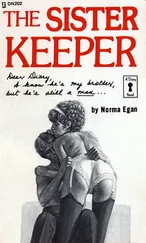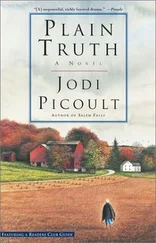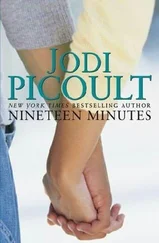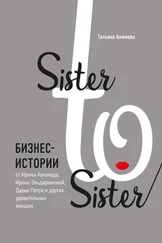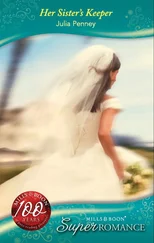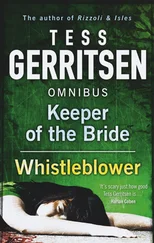But Kate came out of nowhere and ran after me. She somehow managed to grab me by the back of my shirt moments before I got hit by a passing Toyota.
Every now and then, someone on the block brings this up. Me, I remember it as the time she saved me, instead of the other way around.
My mother gets her first chance to play lawyer. "Dr. Bergen," she says, "how long have you known of my family?"
"I've been at Providence Hospital for ten years now."
"In those ten years, when some aspect of Kate's treatment was presented to you, what did you do?"
"Come up with a plan of action that was recommended," he says. "Or an alternate, if possible."
"When you did, at any point in your report did you mention that Anna shouldn't be a part of it?"
"No."
"Did you ever say this would hurt Anna considerably?"
"No."
"Or put her in grave medical danger herself?"
"No."
Maybe it's not Campbell, after all, who will turn out to be my white knight. Maybe it's my mother.
"Dr. Bergen," she asks, "do you have kids?"
The doctor looks up. "I have a son. He's thirteen."
"Have you ever looked at these cases that come to the medical ethics committee and put yourself in a patient's shoes? Or better yet, a parent's shoes?"
"I have," he admits.
"If you were me," my mother says, "and the medical ethics committee handed you back a piece of paper with a suggested course of action that would save your son's life, would you question them further… or would you just jump at the chance?"
He doesn't answer. He doesn't have to.
Judge DeSalvo calls a second recess after that. Campbell says something about getting up and stretching my legs. So I start to follow him out, walking right past my mother. As I pass by, I feel her hand on my waist, tugging down my T-shirt, which is riding up in the back. She hates the spaghetti-strap girls, the ones who come to school in halters and low-riders, like they're trying out as dancers in a Britney Spears video instead of going to math class. I can almost hear her voice: Please tell me that shrank in the wash.
She seems to realize mid-tug that maybe she shouldn't have done this. I stop, and Campbell stops, too, and her face goes bright red. "Sorry," she says.
I put my hand over hers and tuck my shirt into the back of my jeans where it should be. I look at Campbell. "Meet you outside?"
He's giving me a look that has Bad Idea written all over it, but he nods and heads down the aisle. Then my mother and I are nearly alone in the courtroom. I lean forward and kiss her on the cheek. "You did really great up there," I tell her, because I don't know how to say what I really want to: that the people you love can surprise you every day. That maybe who we are isn't so much about what we do, but rather what we're capable of when we least expect it.
KATE MEETS TAYLOR AMBROSE when they are sitting side by side, hooked up to FVs. "What are you here for?" she asks, and I immediately look up from my book, because in all the years that Kate has been receiving outpatient treatment I cannot remember her initiating a conversation.
The boy she is talking to is not much older than she is, maybe sixteen to her fourteen. He has brown eyes that dance, and is wearing a Bruins cap over his bald head. "The free cocktails," he answers, and the dimples in his cheeks deepen.
Kate grins. "Happy hour," she says, and she looks up at the bag of platelets being infused into her.
"I'm Taylor." He holds out his hand. "AML."
"Kate. APL."
He whistles, and raises his brows. "Ooh," he says. "A rarity."
Kate tosses her cropped hair. "Aren't we all?"
I watch this, amazed. Who is this flirt, and what has she done with my little girl?
"Platelets," he says, scrutinizing the label on her IV bag. "You're in remission?"
"Today, anyway." Kate glances at his pole, the telltale black bag that covers the Cytoxan. "Chemo?"
"Yeah. Today, anyway. So, Kate," Taylor says. He has that rangy puppy look of a sixteen-year-old, one with knobby knees and thick fingers and cheekbones he hasn't yet grown into. When he crosses his arms, the muscles swell. I realize he's doing this on purpose, and I duck my head to hide a smile. "What do you do when you're not at Providence Hospital?"
She thinks, and then a slow smile lights her up from the inside out. "Wait for something that makes me come back."
This makes Taylor laugh out loud. "Maybe sometime we can wait together," he says, and he passes her a wrapper from a gauze pad. "Can I have your phone number?"
Kate scribbles it down as Taylor's IV begins to beep. The nurse comes in and unhooks his line. "You're outta here, Taylor," she says. "Where's your ride?"
"Waiting downstairs. I'm all set." He gets out of the padded chair slowly, almost weakly, the first reminder that this is not some casual conversation. He slips the piece of paper with our phone number into his pocket. "Well, I'll call you, Kate."
When he leaves Kate lets all her breath out in a dramatic finish. She rolls her head after him. "Oh my God," she gasps. "He is gorgeous."
The nurse, checking her flow, grins. "Tell me about it, honey. If only I were thirty years younger."
Kate turns to me, blooming. "You think he'll call?"
"Maybe," I say.
"Where do you think we'll go out?"
I think of Brian, who has always said that Kate can date… when she's forty. "Let's take one step at a time," I suggest. But inside, I am singing.
The arsenic, which ultimately put Kate into remission, worked its magic by wearing her down. Taylor Ambrose, a drug of an entirely different sort, works his magic by building her up. It becomes a habit: when the phone rings at seven P.M., Kate flies from the dinner table and hides in a closet with the portable receiver. The rest of us clear the dinner plates and spend time in the living room and get ready for bed, hearing little more than giggles and whispers, and then Kate emerges from her cocoon, flushed and glowing, first love beating like a hummingbird at the pulse in her throat. Every time it happens, I can't stop staring. It is not that Kate is so beautiful, although she is; it's that I never really let myself believe that I would see her all grown up.
I follow her into the bathroom one night, after one of her marathon phone sessions. Kate stares at herself in the mirror, pursing her lips and raising her brows in a come-hither pose. Her hand comes up to her cropped hair—after the chemo, it never grew back in waves, just thick straight tufts that she usually cultivates with mousse to look like bedhead. She holds her palm out, as if she still expects to see hair shedding.
"What do you think he sees when he looks at me?" Kate asks. I come to stand behind her. She is not the child that mirrors me—that would be Jesse—and yet when you put us side by side, there are definite similarities. It's not in the shape of the mouth but the set of it, the sheer determination that silvers our eyes.
"I think he sees a girl who knows what he's been through," I tell her honestly.
"I got on the internet and read up on AML," she says. "His leukemia's got a pretty high cure rate." She turns to me. "When you care more if someone else lives than you do about yourself… is that what love's like?"
It is hard, all of a sudden, to pull an answer through the tunnel of my throat. "Exactly."
Kate runs the tap and washes her face with a foam of soap. I hand her a towel, and as she rises from the cloud of it, she says, "Something bad's going to happen."
On alert, I search her out for clues. "What's the matter?"
"Nothing. But that's the way it works. If there's something as good as Taylor in my life, I'm going to pay for it."
"That's the stupidest thing I've ever heard," I say out of habit, yet there is a truth to this. Anyone who believes that people have ultimate control of what life hands to them needs only to spend a day in the shoes of a child with leukemia. Or her mother. "Maybe you're finally getting a break," I say.
Читать дальше
